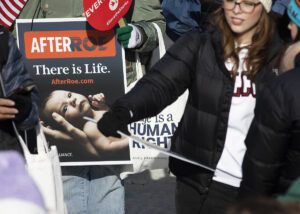My Dear Friends,
In 1973, the United States Supreme Court issued its infamous Roe v. Wade decision, legalizing abortion throughout our land. For 50 years, committed Catholics, Protestants, Orthodox, those of other faith traditions and some with no religious affiliation have labored, marched and prayed to overturn this decision in an effort to protect the lives of the most vulnerable among us – unborn infants in the womb. On June 24, 2022, just seven months ago, these noble efforts of so many bore fruit as the Supreme Court overturned the constitutional right to abortion in its Dobbs v. Jackson Women’s Health Organization decision.

This year has given us all hope. Yet, brothers and sisters, for as encouraging as the past year has been, more than ever, we need to cling to this hope! For the task that we have engaged to build a culture of life in our land remains unfinished.
On Friday, Jan. 20, 2023, marchers from throughout our country will converge on our nation’s capital for the 50th annual March for Life. This year, however, rather than marching to the steps of the Supreme Court, where marchers have gone for decades to ask our highest Court’s Justices to overturn Roe v. Wade, participants will march to a new front in our battle for life: the steps of the United States Capitol.
The theme for this year’s march is Next Steps: Marching in a Post-Roe America. It reminds us of the shift and expansion of the focus of our cause that has occurred since the justices overturned Roe. It is not only incumbent upon us who treasure life to advocate for federal pro-life policies. Now, we must work for the establishment of life-saving protections for the unborn in our state legislatures as well. Given this new landscape in our work to preserve and cherish life, I was honored to join with so many of you from throughout our 11 counties in Harrisburg this past September – close to 6,000 pro-life Pennsylvanians in all – for the first state march since Roe was overturned.
Sadly, for all of the strides that have recently been achieved, the tension that is present in our land following the Supreme Court’s decision is palpable. As such, it is vital that we not only continue our advocacy efforts in Pennsylvania and throughout our country, but that we especially continue to support mothers in need as an integral component of our next steps in building a culture of respect for all of human life.

We need to acknowledge with humility that the Church not only advocates for life in the womb but also works tirelessly to support life in all its forms from conception to natural death. In addition to serving the countless numbers of suffering lives that make their way into our midst, the Church in the United States and right here in our own diocese has developed scores of ministries dedicated to helping mothers facing challenging pregnancies and those who may struggle to care for their children after they are born. Through pregnancy care centers and parish-based ministries such as Walking with Moms in Need – to Shepherds Maternity House in East Stroudsburg that provides a safe home and assistance for pregnant woman and mothers and their newborn babies – to ministries like Project Rachel that offer hope, healing and spiritual renewal to women and couples who suffer after participating in abortion, our Church continues to offer a way forward to those who seek to live the Gospel of Life.
Yet, my friends, remember always that we engage this noble cause not for political reasons but as people of faith. Pope Emeritus Benedict XVI, who recently passed to his eternal reward, reminded all of us of what is foundational to the cause that we have engaged. “God’s love does not differentiate between the newly conceived infant still in his or her mother’s womb and the child or young person, or the adult and the elderly person. God does not distinguish between them because he sees an impression of his own image and likeness (Gn 1:26) in each one. … Life is the first good received from God and is fundamental to all others; to guarantee the right to life for all and in an equal manner for all is the duty upon which the future of humanity depends.”
Simply put, if we desire to live our lives as Christians with authenticity, we have no choice but to proclaim the sanctity of life. We cannot merely speak of our respect for human life or self-righteously criticize those whose beliefs may be different from our own. We must enliven our words with action. Yet, in the midst of all that we are charged to do as disciples of Jesus, his way must always be our way. We must engage a different kind of war – a different kind of battle – than that which has been engaged by many in our land, sadly on both sides of this cause. Jesus never addressed violence with violence. Nor can we! Recall the words of a contemporary prophet of non-violence, the Reverend Dr. Martin Luther King, “Darkness cannot drive out darkness; only light can do that. Hate cannot drive out hate, only love can do that.”
Brothers and sisters, ours is a noble cause rooted in faith and in the dignity of each human person – to bring to completion the unfinished work that has been engaged in our land for some 50 years so that the masterpiece of God’s creative work – the human person – will be respected and treasured from the moment of conception to its natural end. May we be guided by words of Pope Francis, as he challenges us to give witness to our faith, “Being Catholic entails a great responsibility … The Lord counts on you to spread the Gospel of Life.”
Faithfully yours in Christ,
Most Rev. Joseph C. Bambera, D.D., J.C.L.
Bishop of Scranton
